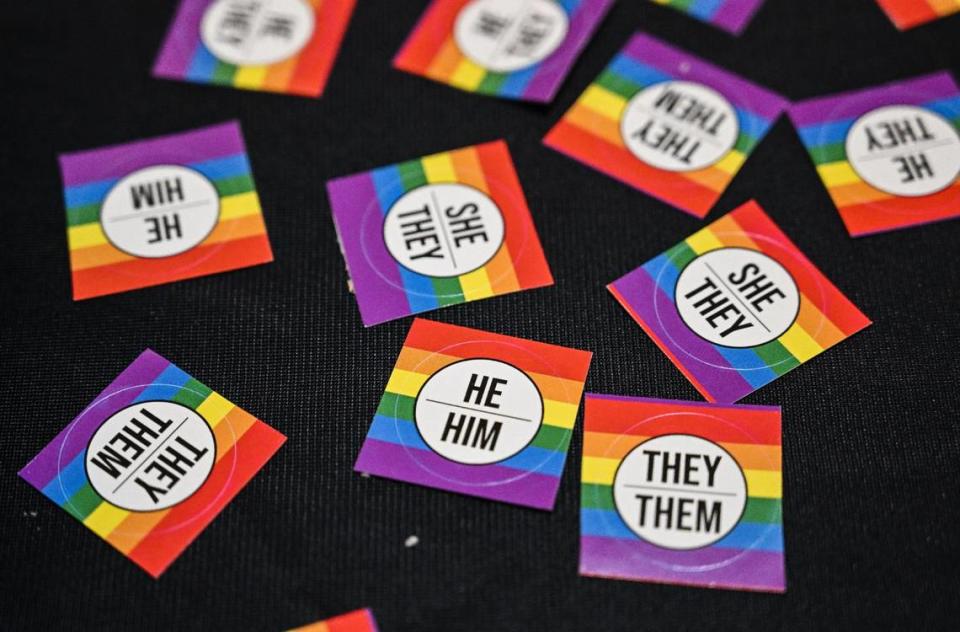Should student gender, pronoun changes be reported to parents? Some in Clovis think so
Clovis parents and others spoke for almost an hour at the latest school board meeting, demanding that elected officials create a written policy to notify parents when students at school decide to change their pronouns, names and gender identity.
If such a policy is established, transgender and gender-nonconforming students could be outed if they were keeping their gender identity private from their parents or guardians. Other students who change their names or pronouns could also be reported.
More than 20 people took the podium at the Clovis Unified School District’s board of trustees meeting this week, voicing concerns that California school districts were “taking away parental rights” and failing to keep parents properly updated on child development.
Many of the commenters used their allotted two minutes of speaking time to expand on their reasoning for requesting a written parental notification policy.
“We should not be teaching this stuff to our children,” said one commenter who did not give her full name. “If they have to sneak and hide all of this from their parents, then that means that it’s not right.”
Across the state, there are ongoing debates in various school districts about whether parents should be notified by the school if their child’s gender identity or presentation changes, such as when a student decides to use different pronouns to describe themselves.
At the Clovis meeting, most of the commenters expressed concern or fear that they might not know that their children could be changing gender identities and presentation.
“Children don’t know what they want,” said a district grandmother who didn’t identify herself. “Thankfully none of my grandchildren want to change their gender because God made them who they are.”
Clovis Unified board members did not respond to the commenters during the public comment period of Wednesday’s meeting because it’s policy and also because a parental notification item wasn’t on the agenda.
Jason Scott, a Clovis parent and executive director of the LGBT Community Network, a local nonprofit that connects LGBTQ people with resources, said “forced outing policies” can be dangerous for students.
“They very much endanger the physical, mental and emotional well-being of these students,” Scott said.
He said that school might be the only safe haven for LGBTQ children who might be living in homes where they don’t feel safe being their authentic selves.
“We hope Clovis doesn’t move forward with anything like this,” he said. “And I don’t think it should even be up for discussion.”
The Bee sent written questions to the school district’s spokesperson, Kelly Avants, asking if such a policy was being considered, among other questions.
Avants responded but did not specifically say if the district is considering establishing a parental notice policy. She wrote that Clovis Unified’s practices are “firmly centered on balancing the rights of students to access facilities and programs based on their identified gender and the rights held by parents and guardians in the upbringing of their children,” she said. In her response, Avants also encouraged parents to talk to their local principal if they have questions about their child’s well-being at school.

Do schools need to notify parents when a child changes pronouns?
Public commenters frequently referenced “state interference” and the Chico Unified School District, in Butte County, where a federal judge dismissed a lawsuit challenging Chico Unified’s policy of not disclosing the gender identities of students.
Chino Valley Unified School District, in San Bernardino County, in July was the first to adopt a policy requiring schools to notify parents if a student identified as transgender or gender-nonconforming, reported the Los Angeles Times.
However, a San Bernardino County Superior Court judge recently paused Chino Valley Unified’s new policy, the first legal setback for an effort to implement this type of policy in school districts across the state, The Sacramento Bee reported .
Rocklin Unified School District, northeast of Sacramento in Placer County, voted 4-1 in favor of changing their Parent Rights and Responsibilities policy on Wednesday evening. The district now requires schools to notify parents if their child changes their name, pronouns, gender expression or shows any indication of experimenting with or changing their gender identity.
California Attorney General Rob Bonta condemned the Rocklin Unified School District board of trustees. In a statement, Bonta said the state “will not tolerate any policy that perpetuates discrimination, harassment, or exclusion within our educational institutions.”
The California Department of Education (CDE) strongly recommends that schools keep records that reflect a transgender student’s birth name and assigned sex (like a copy of a birth certificate) apart from the student’s school records to “prevent accidental disclosure of a student’s transgender status.”
On its FAQ page, the CDE answered what steps should a school or school district take to protect a transgender or gender-nonconforming student’s right to privacy.
“Schools must consult with a transgender student to determine who can or will be informed of the student’s transgender status, if anyone, including the student’s family,” the CDE states. “With rare exceptions, schools are required to respect the limitations that a student places on the disclosure of their transgender status, including not sharing that information with the student’s parents.”
The Trevor Project, a national organization focused on suicide prevention organization among lesbian, gay, bisexual, transgender, queer & questioning (LGBTQ) youth, polled 716 LGBTQ people ages 13 to 24 last year. “An overwhelming majority” responded that they have been negatively impacted by recent debates and laws around anti-LGBTQ policies, the group reported.
In the first two weeks of 2023, more than 150 anti-LGBTQ bills were prefiled or introduced across 23 states, according to The Trevor Project.
“We must consider the negative toll of these ugly public debates on youth mental health and well-being,” said Kasey Suffredini, the organization’s vice president of advocacy and government affairs.
“LGBTQ young people are watching, and internalizing the anti-LGBTQ messages they see in the media and from their elected officials,” Suffredini said.

